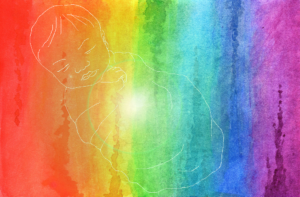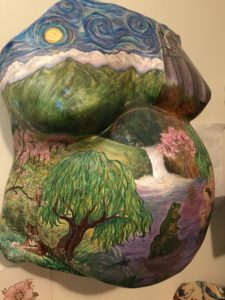What are Babies For?
When I received the news thirteen weeks into a pregnancy that the baby I carried had Trisomy 18, the most common of the rare chromosomal abnormalities, and the one dubbed “incompatible with life,” I had to figure out what to do. But this was much more than a logistical problem. It was, in fact, a spiritual problem.

Think of the “typical” pregnancy. It is fraught with emotion and expectation, of course, but it’s generally assumed that there will be an outcome: the birth of the baby. Mothers prepare themselves. Buy clothes. Decorate a nursery. Friends ask after the mother and everyone waits excitedly for the moment when they meet the baby.
Because I carried a baby who could die in utero and at any-time, and because this baby likely would not survive birth were she to make it that far, and if she did survive birth would statistically only live a few hours, the meaning of pregnancy radically altered.I did not meet my baby. And what is a pregnancy if it is not about a baby you can meet in nine months? What is a child, if it is not someone you could watch grow up? Larger and larger questions came to my mind in the morning I received the baby’s diagnosis. What would it be like to have others ask after the baby and know she would never meet their or my expectations—these expectations that she would live and breathe and wear some clothes I bought for her?
 I wrestled all that day, desperate for an answer of what to do in the immediate sense. Because while I was pregnant, I would not have a child. Not one to hold and nurse, not one to eventually nag and fight with. What do you do with a baby in utero who is there and on their way out?
I wrestled all that day, desperate for an answer of what to do in the immediate sense. Because while I was pregnant, I would not have a child. Not one to hold and nurse, not one to eventually nag and fight with. What do you do with a baby in utero who is there and on their way out?
I needed an answer. No one else seemed to have one for me. I experienced, as many others have, a bleak silence in the face of such a diagnosis. Few know what to say and so say nothing at all. The loneliness is unbearably long. Though I am a minister, even in my communities of faith, nothing could reach me, though I say honestly that nobody tried.
The answer that came to me was simply this: that I would love the baby. That was all. That I would love her. For the moment and the day. For as long as she was with me. For as long as I was alive. I realized that I did not have any other choice. That my only power was in my choice to love her, to love her just as she was.
Because of the nature of Trisomy 18, different in many ways than 21, there was no wondering if she could make it or simply live differently. The doctor confirmed through ultrasound that her brain was slowly filling with fluid. My choice was not to fix her. She was unfixable. My choice was only to love her. And I did. And I do.
And that realization illuminates for me the spiritual kindness that we can offer to ourselves and all who lose pregnancies, babies and children. What are babies for? Are they for us? Are they for our own happiness? Do we have them so we have someone cute to dress? Or so we can impress others?
We know none of that is true. Children are for themselves. As Kahlil Gibranso beautifully said, “Our children are not our children. They are the sons and daughters of life’s longing for itself.” The layers of expectation we put upon our children is tremendous but only clearly seen inside of the loss of one. Even a living children will not satisfy us or keep us happy or fulfill all our expectations. And a child who is not even here—even less so.
It is a profound and devastating lesson that breaks the heart to expand it. But it is a truth of life. There are no guarantees. I do have living children and to love them is to know that their lives do not belong to me nor can I write the story of how long they will live.
I have a dear friend who lost a son at five years old. Because he was born with a condition that was known to lead to such an outcome, my friend did not parent for the future. As so many of us do, she did not parent for graduation day or for future grandchildren. She parented for the moment. For each moment.
This is the lesson of spirituality we would pay to learn on a 10-day silent retreat. Delivered so ruthlessly as in loss it comes unwelcome and cruel. The spiritual treasure remains, however much we may howl, grieve, and despair over our loss. To love anyone in the moment is all we ever have. The “future” of our children is a mirage. We may love to believe in it, but we cannot know it with any certainty.

What I did not realize in that moment when I decided to simply love my Trisomy 18 babywas that I was doing the yoga of grief, of parenting, of life. The yoga of present moment. Do we love for the future? Well, we must be taught then to love for the now. Do we have kids for the future? Well, we must learn that our kids are only here now.
In romantic relationships, how clearly we see this: I will love you if you stick around. I will love you if you fulfill my wants. I will love you if you love me. But parenting is monastic training that rattles the whole spiritual house. That is not what love is or what love does. If we love, it is simply because we long to, need to, want to, and can do nothing else. We cannot control what comes back to us or the condition of the one whom we love. Ultimately, we love for its own sake. This is a deep practice and a true one.
Perhaps you have learned it, too.
The other day my friend who lost her son and has a living daughter wondered how to parent both children—one on the earth and one not. How do we walk through any of this? How do we parent and why? In the end, we must lay down our own agendas. Our children will ask for exactly what they need. That we love them and let them go. That we love them and accept them as they are. That we love them though they disappoint us heartbreakingly. That we love them though they cannot ever be what we hope—perfectly safe, well and alive forever and ever in our arms and on the earth.
But maybe in the practice of loving we learn to meet them where they are, wherever that is. Because love is both the most powerful and most invisible force, it may also be the secret to what our hearts so long for. To love and never lose may simply be to love and keep loving. To love and never lose may simply be to become the one who can keep loving whatever the outcome may be. Love doesn’t depend on outcomes, of course. What the heart needs to heal is the love beyond circumstances. And this is the love our losses have gifted us with. For me, it is a long steep climb to get close to the goodness of that thought, but I take it step by step. May we each hold the treasure of that love as close to us as our breath.
This is the best philosophy I have seen about babies we know cannot live. And children who will live, parenting them for themselves, not for us. I appreciate your wisdom always.
Thank you for this encouragement! It took me some time to discover what my “higher mind” had to say. Just a couple years 🙂
So profoundly beautiful Sam. The yoga of grief.
“Our children will ask them for exactly what they need. That we love them and let them go.” Yes.
Exactly my experience, especially as they grew older.
This is a Big Question, what are babies for?
Yes, babies are for themselves. Love is truly the one clear necessity. It is everything.
Yes, as they grow older so true! My teenagers are helping me understand and clearing up any confusion about that!! Thank you for your loving response.
Sammie, You are truly amazing.Your writing is profound, true, difficult to truly live, to love without expectation or fulfillment in what makes us feel good….AHHHHH….to love unconditionally…..Wow….outstanding revelation. thanks for sharing your awareness with us . I am sorry that I wasn’t there for you and did not understand the deep pain that you were going through at the time of your baby’s diagnosis.
Thank you for your encouragement. You have been there for me so many times and I’m grateful! Sending you love.